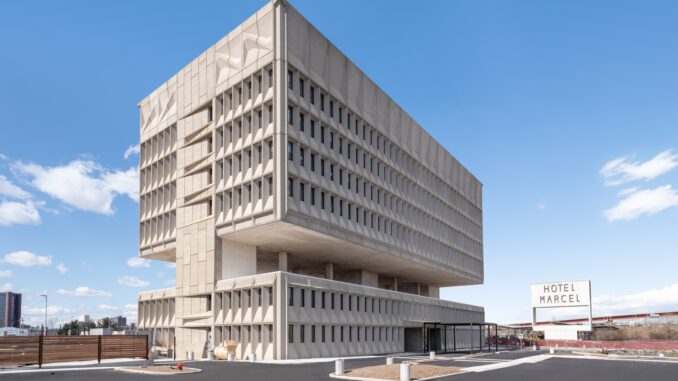
By HTN Staff - 4.25.2022
Environmental sustainability has become a big focus of the hotel industry in recent years. Among the major hotel brands making sustainability efforts are Accor, Hyatt, IHG Hotels & Resorts and Hilton Hotels, which will soon make history as it opens what is believed to be the first net-zero hotel in the United States: Hotel Marcel New Haven.
Part of the Tapestry Collection by Hilton, an upscale portfolio of more than 70 properties, the revolutionary hotel will reportedly utilize renewable solar power sources on site to generate the electricity needed for its common areas, restaurant, laundry, meeting rooms, and 165 guest rooms and suites.
According to a company statement, Hotel Marcel New Haven will operate independent of fossil fuels, resulting in zero carbon emissions. It is also expected to be the first Passive House-certified hotel in the country, and will be one of fewer than a dozen LEED (Leadership in Energy and Environmental Design) Platinum-certified hotels in the country.
The eco-friendly hotel is the result of the innovative vision of lead architect, developer and owner Bruce Redman Becker, FAIA, LEED AP of Becker + Becker. He purchased the building, which originally opened in 1970 as the Armstrong Rubber Company Headquarters, and modernized it with sustainability as the key focus every step of the way.
“We are all responsible for confronting the climate crisis, and that sense of obligation factored into every decision we made in creating Hotel Marcel New Haven,” said Becker. “The opening of this revolutionary hotel, which is giving new life to a New Haven landmark, is a momentous occasion for travelers, the industry and the planet. Guests will be ensured a terrific hotel experience and can relax knowing that both they, and the environment, are being cared for during their stay.”
Listed on the State and National Register of Historic Places, the iconic building, originally designed by Marcel Breuer, is a fitting destination for a new cutting-edge hotel which still nods to the building’s history. Features in the transformation of the building include a power-over-ethernet lighting system that reduces lighting energy use by more than 30%; repurposed building materials throughout, such as light fixtures and carefully restored wood-paneled walls in suites that were once the Armstrong executive offices and conference rooms; and extensive upgrades to enhance interior temperature control and air quality, resulting in the building using significantly less energy per square foot than most hotels.
Becker + Becker, along with partner Dutch East Design, retained many design elements of the original building’s Brutalist architecture with board-formed concrete and granite tile and a focus on functionality, clean lines and geometric forms. Operated by Remington Hotels, Hotel Marcel New Haven restores the former property’s structure and celebrates its storied history, while adding contemporary aspects including 7,000 square feet of meeting and event space with a penthouse courtyard.
The green design of Hotel Marcel New Haven also improves guest comfort. Triple-glazed windows provide ultra-efficient insulation to keep guest room temperatures stable, while greatly reducing noise levels. Built-in motorized sheer and blackout window shades provide a better night’s sleep. Guests and travelers on the go also have the convenience of 12 Tesla Superchargers or universal level-two chargers for their electric vehicles.
Dining offerings at Hotel Marcel New Haven further demonstrate the hotel’s sustainable experience. The onsite American restaurant and lounge BLDG (pronounced “building”) offers locally sourced menu items served alongside biodynamic and organic wines. BLDG’s kitchen, as well as the hotel’s laundry room, run on electricity instead of natural gas. The kitchen uses induction, an energy-efficient process that ensures a more precise and even heat. In addition to the restaurant and bar, Hotel Marcel New Haven features a grab-and-go station offering sustainable snacks as well as design-focused gifts and a water filling station.
“Hotel Marcel New Haven is a major milestone for the Tapestry Collection by Hilton brand as the first anticipated net-zero hotel in the U.S.,” said Jenna Hackett, global brand head, Tapestry Collection by Hilton. “Each Tapestry Collection property displays an original style and personality while also encouraging guests to explore local destinations. Hotel Marcel New Haven will connect travelers with the New Haven area while inspiring them to incorporate sustainability into every aspect of their stay. We look forward to celebrating this new and exciting chapter for this unique landmark with our guests.”
Hotel Marcel New Haven will help showcase Hilton’s Travel with Purpose program, an Environmental, Social and Governance (ESG) strategy to drive responsible travel and tourism globally. Hilton is focused on paving the way toward a net-zero future and remains committed to partnering with its owners to help minimize carbon footprints and redefine sustainable travel. As part of this commitment, the hotel brand has set a goal of reducing its utility costs, greenhouse gas emissions and carbon intensity by 61% by 2030.
For its various environmental and social initiatives, Hilton was recently named a global sustainability leader on the Dow Jones Sustainability Indices for the fifth consecutive year, and was the only hotel company to earn Gold Class distinction in S&P Global’s Sustainability Yearbook.
Meanwhile, real estate developer Urban Villages has reportedly started construction on Populus, which it bills as the first carbon positive hotel in the United States. Slated to open in Denver in late 2023, the 265-room hotel is expected to be carbon positive on account of both to a sustainable design and construction features as well as a substantial ecological effort offsite.


